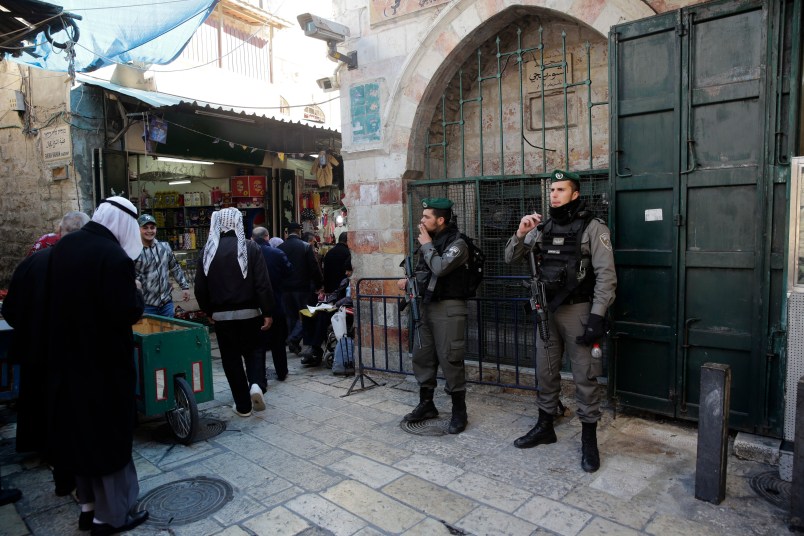JERUSALEM (AP) — Israeli police deployed reinforcements in and around Jerusalem’s Old City on Friday, in anticipation of Palestinian protests over the Trump administration’s recognition of the contested city as the Israeli capital.
Palestinian political groups have called for massive demonstrations in the West Bank, Gaza Strip and east Jerusalem after Friday prayers, the highlight of the Muslim religious week. Separately, the Gaza-based leader of the Islamic militant Hamas has agitated for a third uprising against Israel.
Meanwhile, the militant al-Qaida network urged followers around the world to target vital interests of the United States, its allies and Israel. A statement posted Friday on al-Qaida’s media arm as-Sahab called for holy war or jihad and described America as an oppressor of Muslims.
President Donald Trump’s seismic policy shift on Jerusalem, announced earlier this week, also provoked outrage elsewhere in the Arab and Muslim world, including among U.S allies such as Jordan and Egypt.
Street protests were expected Friday across the region. Hundreds of Muslims in Indonesia and Malaysia protested outside U.S. Embassies.
For decades, the United States had professed neutrality on the fate of Jerusalem, in line with an international consensus that the fate of the holy city should be determined in negotiations.
Israeli-annexed east Jerusalem, captured by Israel in 1967, is sought by the Palestinians as a future capital. It is also home to major Muslim, Jewish and Christian shrines. Israel claims all of Jerusalem as its capital.
The opposing claims lie at the heart of the Israeli-Palestinian conflict and have often precipitated deadly violence.
On Friday, all eyes were on east Jerusalem’s Old City, home to the Al-Aqsa Mosque compound, which is Islam’s third holiest shrine and stands on the remnants of Judaism’s holiest site. One of the compound’s outer walls is the holiest site where Jews can pray.
In the past, Israeli authorities often imposed age restrictions, barring younger Muslims from entering the Al Aqsa compound during periods of tensions.
Police said there were no age limits for Muslim worshippers to access their holy site on Friday, but that officers would respond to any disruptions.
After Trump’s announcement Wednesday, Palestinian groups had called for three “days of rage” as a response.
On Thursday, thousands of Palestinians protested and clashed with Israeli forces in east Jerusalem and the West Bank. And in the Gaza Strip, demonstrators burned U.S. flags and pictures of President Donald Trump and Israeli Prime Minister Benjamin Netanyahu.
Dozens of Palestinians were slightly injured in the clashes, mostly from tear gas inhalation. An Israeli military official, speaking on condition of anonymity, said troops were instructed to use minimal force and avoid using live fire to avoid escalating the situation.
The Israeli military announced that it is putting troops on alert and deploying additional battalions in the West Bank.
Trump’s declaration on Jerusalem departed from decades of U.S. policy and upended longstanding international assurances that the fate of the city would be determined in negotiations.
Though Trump insisted that the move was meant to acknowledge the current reality, and not prejudge negotiations on Jerusalem’s status, it carried deep symbolic meaning and was seen by the Palestinians as siding with Israel.
___
Daraghmeh reported from Ramallah, West Bank. Associated Press writer Maamoun Youssef in Cairo contributed to this report.






